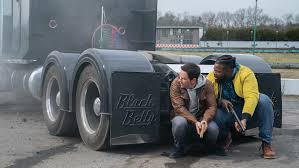Netflix’s recent Spenser Confidential is a journey into a cinematic heart of darkness. To watch its full 111 minute run-time is to risk madness and death. This soulless, brainless, joyless slog purports to be adapted from Robert B. Parker’s long-runner Spenser series, specifically from one of the actually-pretty-damn-good continuation volumes written by Ace Atkins, but it’s an adaptation the way a zombie is the person you once loved.
Everything that makes the literary Spenser an enduring and distinctive character–one of the most influential in the PI subgenre of detective fiction–is absent here. Parker’s Spenser is a kind of laid-back ideal, a man of principle and action with a penchant for sharp and witty turns of phrase, a guy equally at home in the gym and the kitchen. He shook up the loner world of fictional PIs by having a long-running, sincere commitment to his psychologist girlfriend. He’s appealingly comfortable with himself, and he’s willing and able to a respect and appreciate a wide range of people. Spenser was one of my first–and few–fictional heroes, among a handful of characters that I looked at and genuinely wished I could emulate.
Peter Berg casts Mark Wahlberg in the part and at one point resorts to putting him in glasses to make him look smarter. It doesn’t work.
Wahlberg can be good within a limited range, and he can be bad within a limited range; here, he’s bad, not playing a specific part so much as exactly what the audience would expect from seeing him on the poster. In his portrayal, Spenser is a lunkhead whose many failures are comic relief. He’s not a man who has accepted that violence is a sometimes-fundamental part of his moral code, he’s a man–a bro, really–who thinks with his fists and his dick. He doesn’t cook. He doesn’t date psychologists, because what psychologist would have him, except as a bizarre case study? His girlfriend in Spenser Confidential is the cartoonish and cheerfully vulgar Cissy (Iliza Shlesinger), the owner of a dog grooming service; at one point, they loudly fuck in a public restroom. His deductions are mind-boggling stupid: at one point, he works out that a man he knew briefly five years ago couldn’t have killed himself now, because hey, he was happy then, right?
The movie also seems to go out of its way to strip him of any of his literary counterpart’s characteristics–giving him a girlfriend, but not the one he has for nearly the entire series; giving him an ally in Hawk, while ditching ninety percent of Hawk’s original characterization, including his charm and sense of danger; giving him his dog named Pearl, but making her a completely different breed; booting his private eye job for a bizarre “disgraced, felon ex-cop” setup; overhauling his entire backstory for the sake of a throwaway explanation for something that doesn’t need to be explained.
Some of this, admittedly, is agonizingly awful only to fans of the books. But make no mistake, this movie is also accessibly atrocious, with no special knowledge necessary. It has by-the-numbers plotting that lurches along with a visible sense of exhaustion, assembling an uncompelling odd couple friendship with his roommate Hawk (a mostly wasted Winston Duke) and a will-they-won’t-they-who-could-possibly-give-a-shit back-and-forth with ex-girlfriend Cissy. The movie alternates between being starkly, grimly humorless to trying to wring laughter out of bits like “man chased by dog” and “man in his forties has no idea how computers work, except when later he knows all about FaceTime.” The extent of “witty” banter is Cissy asking Henry (Alan Arkin, as wasted as Duke) if he was subjected to ass-play during his brief time as a hostage. The plot is a pointless, unsurprising heap of cliches, full of people making terrible decisions for unknown reasons. Bokeem Woodbine, as supporting character Driscoll, is one of the film’s few bright spots, mostly because he at least seems to be awake, and his presence is engaging even if his actual material is not.
As a random action-comedy-thriller, there’s no reason for something this dull and poorly executed to exist. As an adaptation, it ignores its source material to the point of negating the point of licensing it. It’s enough to make you wonder if the film wasn’t written and shot in its entirety before the rights came through, with the names “Spenser” and “Hawk” being put in through ADR in a desperate attempt to make the movie slightly more marketable by attaching it to a preexisting beloved property. This is almost impressively, stupefyingly bad, but I can’t in good conscience even recommend it as a hate-watch. Even if you have large quantities of alcohol on hand–which would be the only way to make this tolerable–there’s the chance that your viewing numbers might contribute to there someday being the sequel the movie’s ending teases so blatantly. And honestly, no one wants that on their conscience.

